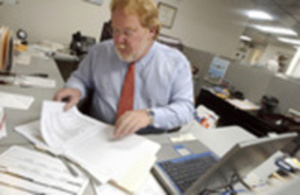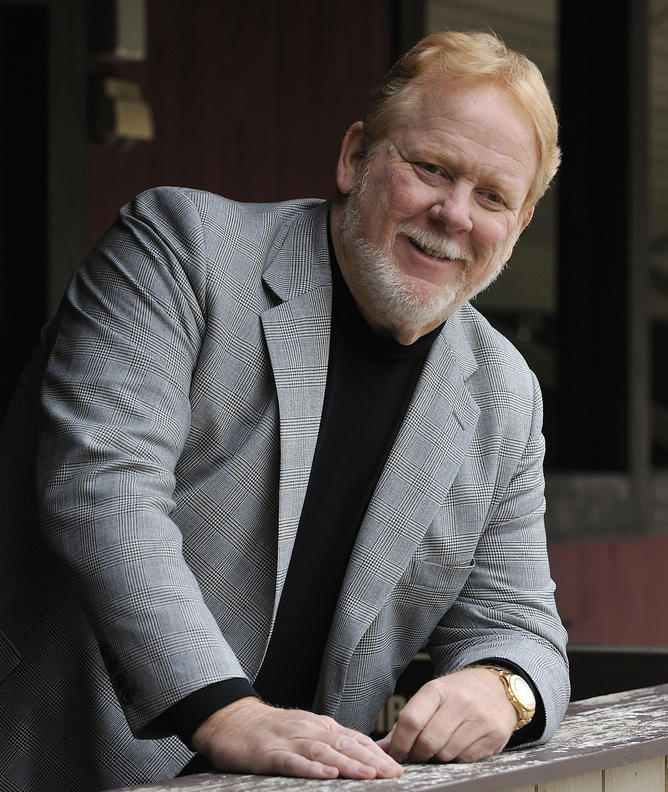Sweet as he was, Rusty Flack was not a “sweet evening breeze,” a nickname we used for one of our friends more than 30 years ago when we first met.
Rusty was a rock and rolling thunderstorm of laughter, love, and generosity. A friendly tsunami who swept through life leaving all he touched awash with glow, he knew neither nuance nor subtlety.
He lived and died in northeastern Pennsylvania, where he and I became friends and where he later helped me buy a newspaper, The Times Leader. That purchase put me in a position to form MaineToday Media, which now owns The Portland Press Herald/Maine Sunday Telegram, Kennebec Journal and Morning Sentinel; so Rusty had an impact here as well as in Pennsylvania’s Wyoming Valley, where he was not only a treasured friend to those who knew him but a respected and admired community leader.
Other than welcoming the night as a good time to throw a party, there was no evening, no end of the day for Rusty Flack. He was always the bright, hopeful, shining morning for so many of us who were touched by his love and indomitable spirit.
He was all-night radio, Wolfman Jack, Mr. ’70s and ’80s, Jimmy Buffett, the Beatles, Corvettes, James Dean in a nose tackle’s body. He was a young hippie with a mind for conservative politics and somewhat of a human Rubik’s Cube, except in his heart, for which there was no mystery to ponder or unlock. It shone clearly like a beacon in the night. He joined the Love Generation and never left it.
He was a pirate who turned 40.
I met him at the bar of the Westmoreland Club in Wilkes-Barre, Pa., me running a newspaper at 31 and Rusty, at 24, in charge of a company called Diamond Manufacturing.
Turns out we had recently covered in our paper a municipal meeting where his company had come under some criticism.
“You the new guy running the paper?” he asked.
Proudly, I said I was.
He quickly put me in check.
“When you going to start printing the truth and getting things right?”
As often happens in this business, it turned out we had missed a few points here and there in the story. They were important to the context of the issues. We had been incorrect.
We argued a bit, neither of us giving ground. Then we laughed, toasted, and became friends for life. Simple as that.
That one night, finding ourselves playfully pitted against one another, was the beginning. We proceeded to race headlong into the 1980s, and along the way I formed bonds with many of Rusty’s friends, who became my friends.
Many of us had feet to the floorboards as we sped through our young years of building businesses, careers and families.
For a long time, we held onto a playful sense of immaturity and recklessness. We never expected to say goodbye. We never expected to die or watch our friends die.
Many of us had nicknames bestowed by our friend, the late John McCole — he was the sweet evening breeze — and we loved those nicknames in the laughter of our youthful cockiness. Tongue in cheek and self-deprecating, the nicknames also held in them a future hope of accomplishment that we kept hidden.
In that milieu, Rusty was “The Great Industrialist,” and I was “Pulitzer.” We had an irascible, irreverent and everything else “ir” friend we called “Zoomer.” That one was the bastardization of a biblical name of some sort that grew from a bunch of Christians trying to understand Yiddish.
Another friend, “Dead Tree,” was in the lawn and nursery business.
Rusty was always the trunk of our tree of friendship. He still is. The newspaper obituaries say he died at age 56 early Thursday morning, after essentially defying the savagery of colon cancer for two years.
He will never die.
A spirit that big, a presence that large, of physique and of heart, touches so many and touches them so deeply that he comes into a life and stays forever.
Visible footsteps from Rusty’s life are imprinted in the sand of his community forever. He took over a family business while almost still a boy, rescued it financially, built trust and efficiency among a unionized work force, became a brilliant businessman, served as chairman of a hospital, and on and on.
He left many other traces as well.
He was inspirational father to four children, caring husband to one wife, dutiful son to his mother, keeper of his father’s dreams, foundation of strength for a brother and sister.
They carry his legacy.
Those who knew him carry the gift of having been touched by him personally in so many ways, large and small — private recollections that would embarrass him in public recitation. So, we keep them to ourselves, and he will live within us as an example of who we should be, how we should live.
If a person who knew him well could tell you one thing about Rusty that would encapsulate how much he was admired and trusted it would be this: Several of his friends, not relatives, appointed him as guardian of their children in the event that both parents died prematurely.
Throughout his life, he knitted the patchwork of a quilt of friendship that was as inclusive as it was broad and diverse. He literally brought hundreds of people together and bonded them with his embrace.
Except for a few Democrats, he loved everyone, enduring but never abandoning quirky friends who matched his perfection with their imperfections and laughing with them all.
His wry sense of humor, delivered in quick, penetrating one-liners, could lighten the darkest corner of a day or night.
Rusty was comical in his acquisition of boats, cars, homes, and rock ‘n’roll memorabilia. There was nothing funny about his incredible gift for building personal coalitions, linking his friends to other friends until everyone in his aura suddenly shared friendshps. No one did it better.
Despite a large and heavy frame, he could glide around a dance floor like a swan before he’d take the stage at a wedding or party and knock the lights out with his cover of “Born to be Wild.”
Unlike the musical misfits who would often join him on stage, he could actually sing, actually carry a tune.
He created a songbook of memories of a life lived well — no, lived greatly.
William Faulkner wrote that “man will not merely endure, he will prevail.” That was Rusty Flack, who, also borrowing from a Faulkner speech, took it upon himself to make it “his privilege to help man endure by lifting his heart, by reminding him of the courage and honor and hope and pride and compassion and pity and sacrifice which have been the glory of his past.”
“He taught us to live,” said one of his closest friends, “and then he taught us how to die.”
Fighting and fighting and fighting for the last two years against the long-shot odds of beating colon cancer, his spirit was bountiful, his hope eternal, his optimism undiminished.
If he knew pain, he never winced, never flinched.
And then, when he had done his best, when he had given it his all, he knew his time was up. A graceful giant of a robust, life-loving man, he drifted into the sweet evening breeze surrounded by his loved ones.
He will always drift above and among us.
Richard L. Connor is CEO of MaineToday Media, owner of The Portland Press Herald/Maine Sunday Telegram. A newspaperman for 40 years, he has served on two Pulitzer Prize for Journalism nominating committees. He can be reached at:
rconnor@pressherald.com
Send questions/comments to the editors.




Success. Please wait for the page to reload. If the page does not reload within 5 seconds, please refresh the page.
Enter your email and password to access comments.
Hi, to comment on stories you must . This profile is in addition to your subscription and website login.
Already have a commenting profile? .
Invalid username/password.
Please check your email to confirm and complete your registration.
Only subscribers are eligible to post comments. Please subscribe or login first for digital access. Here’s why.
Use the form below to reset your password. When you've submitted your account email, we will send an email with a reset code.